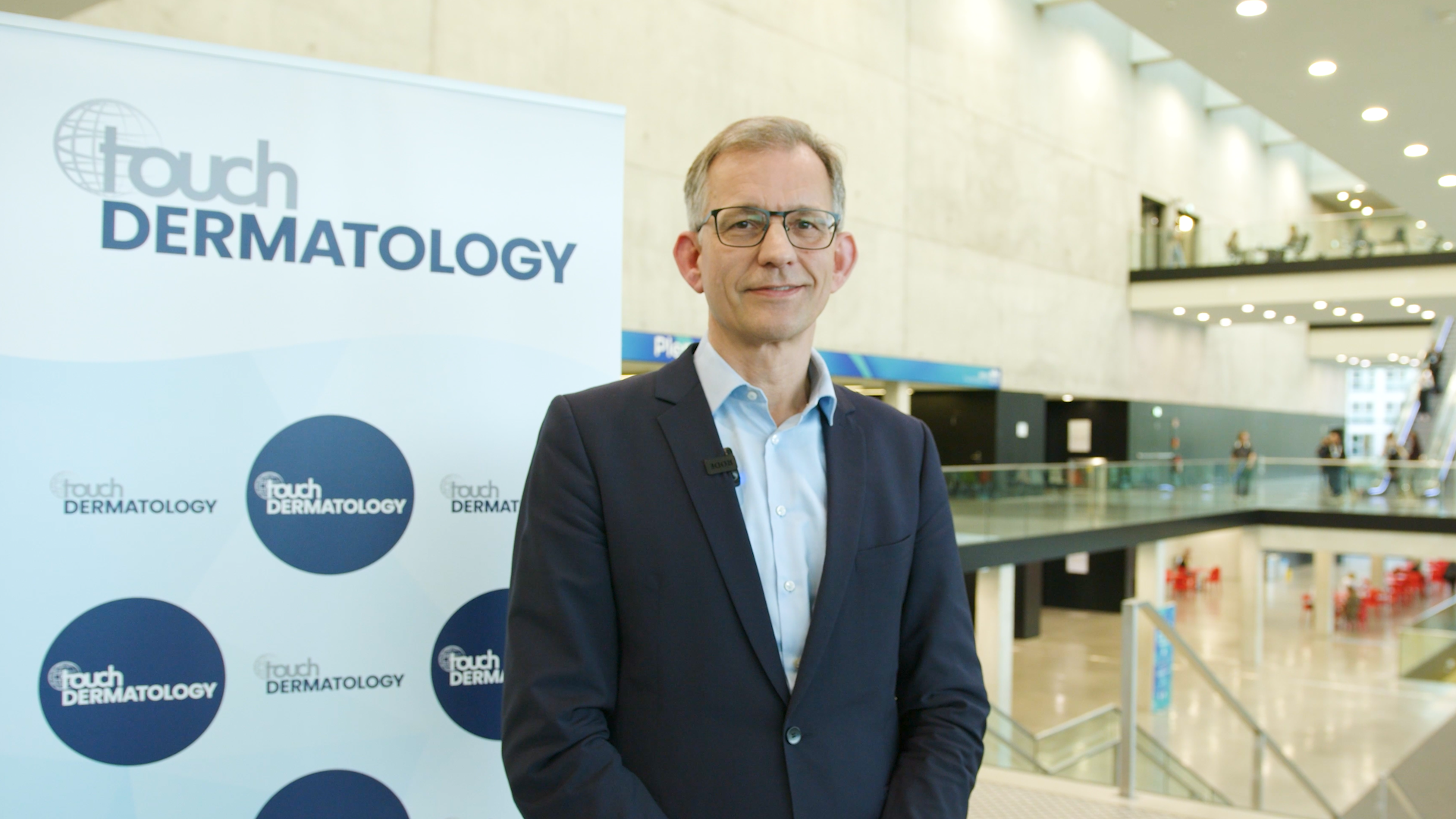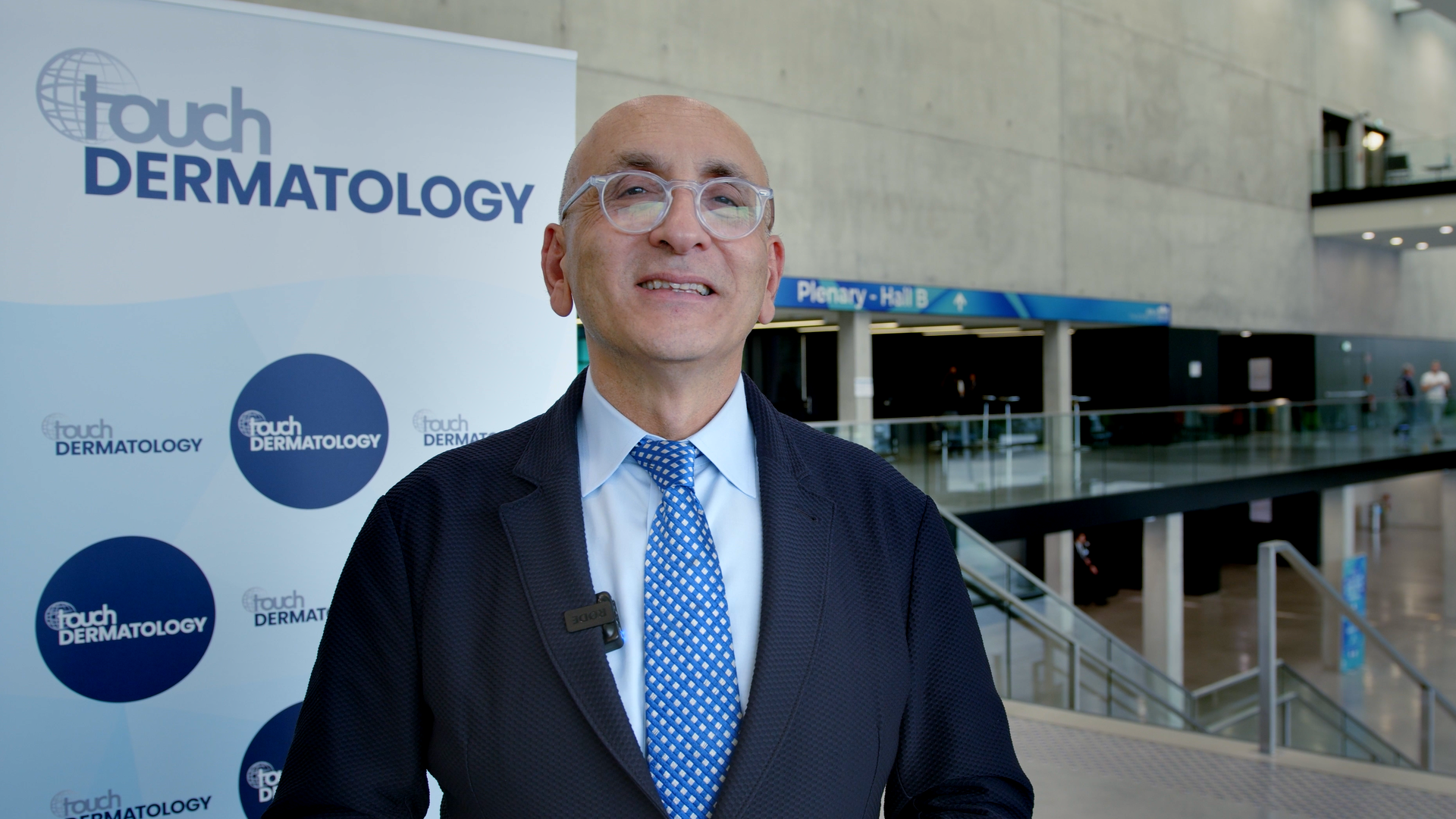Changing the Treatment Paradigm in Generalized Pustular Psoriasis | Insights from AAD 2023
Generalized pustular psoriasis (GPP) is an inflammatory skin disease characterized by widespread eruption of sterile pustules.1 GPP can be life threatening, with deaths attributed to septic shock and cardiorespiratory failure.1 The disease is associated with relapses with recurrent flares or persistent symptoms with intermittent flares.1 Flares can be triggered by a multitude of factors, including upper respiratory infections, stress, medication, medication withdrawal or pregnancy.1,2
Spesolimab is a humanized monoclonal antibody that targets the anti-interleukin-36 receptor.2 The efficacy and safety of spesolimab versus placebo in patients presenting with a GPP flare were assessed in the randomized, double-blind phase II clinical trial Effisayil 1 (ClinicalTrials.gov identifier: NCT03782792).2 Data from Effisayil 1 showed that patients receiving spesolimab achieved superior pustular and skin clearance to those receiving placebo, with spesolimab showing a favourable safety profile.3
Further analysis of data from this trial examined the efficacy and safety of spesolimab versus placebo in patients with GPP whose flare was triggered by extrinsic factors (treatment or steroid withdrawal or dose reduction of any other medication) or intrinsic factors (stress, infection or other factors, such as the patient’s disease condition).3 Dr Claudia de la Cruz provided an overview of these data, which were presented at the 2023 American Academy of Dermatology Annual Meeting.
Fifty-three patients were included in the analysis, with 36 presenting an identifiable trigger. Flares triggered by extrinsic factors occurred in 25 patients, 15 of whom were in the spesolimab group and 10 in the placebo group.3 Flares triggered by intrinsic factors occurred in 11 patients, 6 of whom were in the spesolimab group.3 Patient demographics and clinical characteristics were similar between trigger subgroups.3
The study’s primary endpoint was a Generalized Pustular Psoriasis Physician Global Assessment (GPPGA) pustulation subscore of 0 at week 1.3 A greater proportion of patients treated with spesolimab achieved a GPPGA score of 0 compared with patients treated with placebo regardless of flare trigger.3 For patients whose flare had an extrinsic trigger, 53.3% of patients receiving spesolimab achieved GPPGA 0 versus 10.0% of patients receiving placebo.3 In patients with an intrinsic trigger, these figures were 50.0% versus 0.0%, respectively.3
These results were reflected in the secondary endpoint (i.e. a GPPGA score of 0/1 at week 1). In patients with an extrinsic trigger flare, 53.3% of patients who received spesolimab achieved GPPGA 0/1 versus 10.0% of patients who received placebo.3 In patients with an intrinsic trigger flare, GPPGA 0/1 was seen in 50.0% of patients who received spesolimab and 20.0% of those receiving with placebo.3 Dr de la Cruz commented, “We found out that the dose of spesolimab 900 milligrams intravenous was very effective in treating the GPP flare”.
The occurrence of adverse events (AE) up to week 1 was similar between subgroups. Of the patients with a flare caused by a extrinsic trigger, 66.7% of those in the spesolimab group and 70.0% of those in the placebo group experienced an AE, 6.7% and 10.0% of whom experienced a severe AE, respectively.3 In patients with an intrinsic trigger flare, 83.3% of those in the spesolimab group and 20.0% of those in the placebo group experienced an AE, and 0 patients experienced a serious AE.3
When asked about the impact of these results on clinical practice, Dr de la Cruz said, “To have a patient being treated properly at an early stage of this disease, it’s going to help us have our patient recover from this flare very fast, very quickly, and be inserted in their common life very soon.” She added, “I think this is going to be life changing for these patients.”
The full video interview with Dr De La Cruz is available on touchIMMUNOLOGY here.
The abstract discussed in this interview is the following:
This information is brought to you by Touch Medical Media and is not sponsored by, nor a part of, the AAD.
- Rivera-Díaz R, Daudén E, Carrascosa JM, et al. Generalized pustular psoriasis: A review on clinical characteristics, diagnosis, and treatment. Dermatol Ther (Heidelb). 2023;13:673–88.
- Bachelez H, Choon S-E, Marrakchi S, et al. Trial of spesolimab for generalized pustular psoriasis. N Engl J Med. 2021;385:2431–40.
- de la Cruz C, Morita A, Elewset B, al. Efficacy and safety of spesolimab for generalized pustular psoriasis treatment according to flare trigger. Presented at: American Academy of Dermatology (AAD), New Orleans, LA, USA, 17–21 March 2023. Abstr 43751







